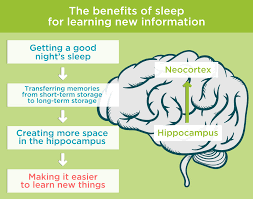In our fast-paced, always-on world, sleep is often viewed as a luxury rather than a necessity. Students in particular tend to sacrifice sleep in favor of late-night study sessions, social media scrolling, or extracurricular activities. However, science tells us that sleep isn’t just important for physical health — it plays a critical role in how we learn, remember, and think.
The Science of Sleep and the Brain
Sleep is not simply a passive state where the body shuts down. It is a dynamic process that restores, reorganizes, and strengthens the brain. While we sleep, our brain goes through different stages, including rapid eye movement (REM) and non-REM (NREM) sleep. Each stage supports learning and memory in different ways:
-
Non-REM sleep, especially deep sleep, helps consolidate declarative memory — the type of memory used to recall facts and concepts.
-
REM sleep, which is when most dreaming occurs, is believed to strengthen procedural memory — the type of memory related to skills and habits, like riding a bike or playing the piano.
How Sleep Enhances Learning

1. Memory Consolidation
When we learn something new, our brain creates new neural connections. Sleep stabilizes these connections, helping to transfer information from short-term memory to long-term storage. This means that pulling an all-nighter before an exam can actually hurt your performance by preventing your brain from solidifying what you’ve learned.
2. Improved Focus and Attention
Lack of sleep leads to decreased concentration, slower reaction times, and poor decision-making. A tired brain struggles to absorb new information and stay focused, making it harder to learn effectively. Well-rested students are more alert, attentive, and capable of tackling complex tasks.
3. Enhanced Problem Solving and Creativity
REM sleep has been linked to creative thinking and problem-solving abilities. During this stage, the brain connects distant ideas and makes novel associations — a process crucial for innovation and original thinking. If you’ve ever gone to bed stuck on a problem and woken up with a solution, you’ve experienced the power of sleep-fueled insight.
Sleep Recommendations by Age
Different age groups require different amounts of sleep to function optimally:
-
Children (6–12 years): 9–12 hours per night
-
Teenagers (13–18 years): 8–10 hours per night
-
Adults (18+ years): 7–9 hours per night
Unfortunately, studies show that many students fall short of these recommendations, especially during the school week.
Tips for Better Sleep and Learning
-
Stick to a routine: Go to bed and wake up at the same time every day, even on weekends.
-
Avoid screens before bed: The blue light from phones and computers can interfere with melatonin production, making it harder to fall asleep.
-
Create a sleep-friendly environment: Keep your room cool, dark, and quiet.
-
Limit caffeine and late-night snacks: These can disrupt your sleep cycle.
-
Use naps wisely: A 20–30 minute nap can boost alertness, but avoid long naps late in the day.

